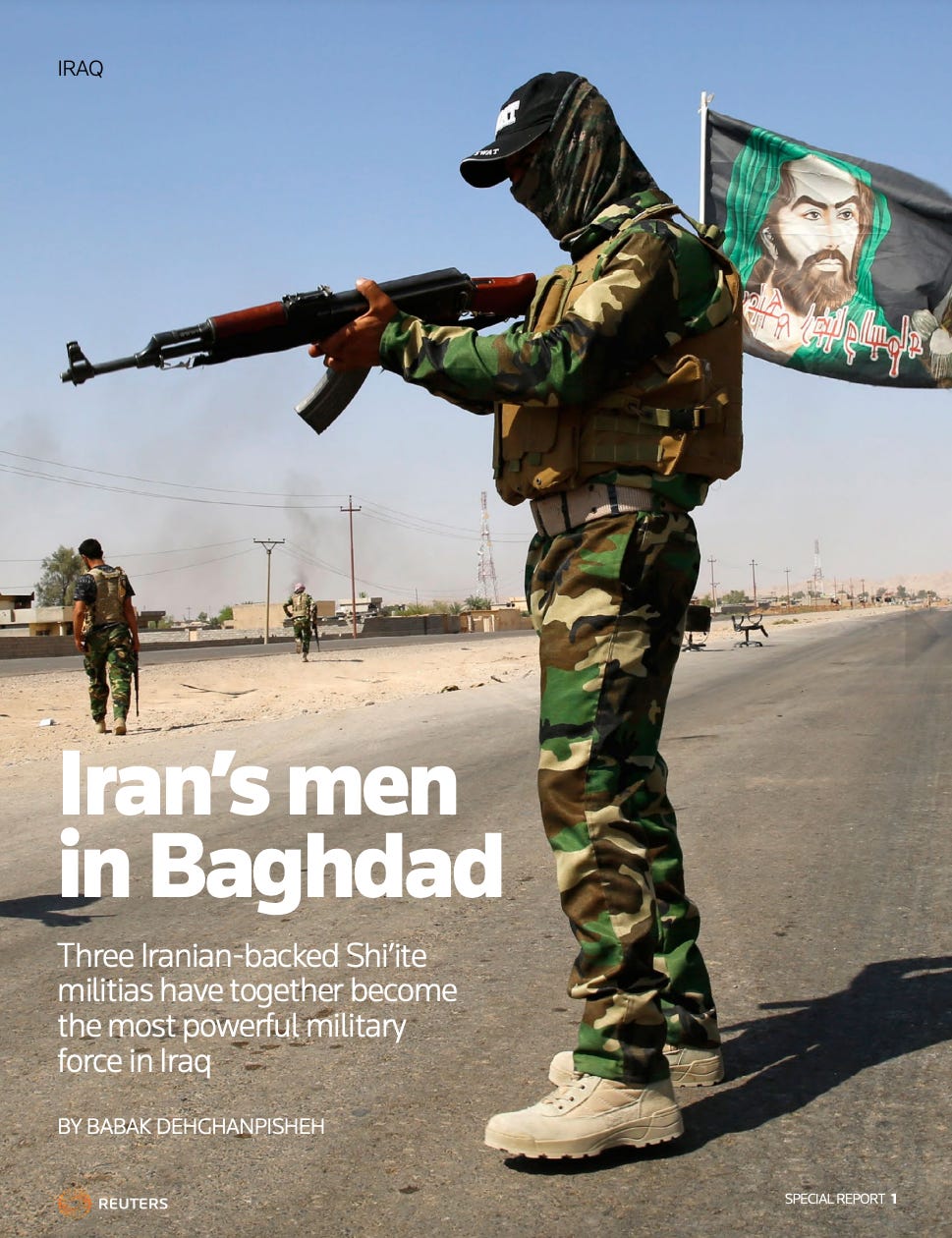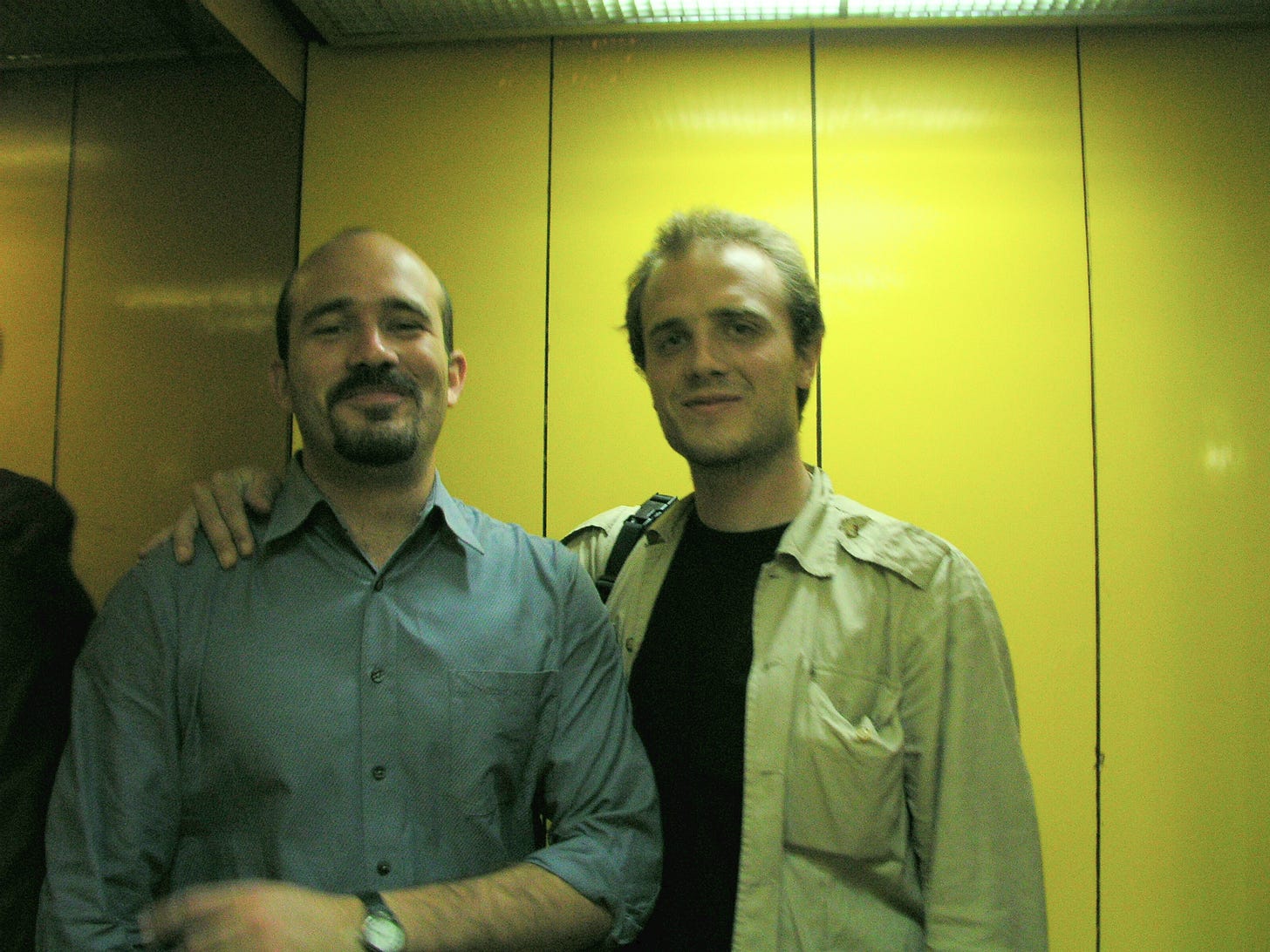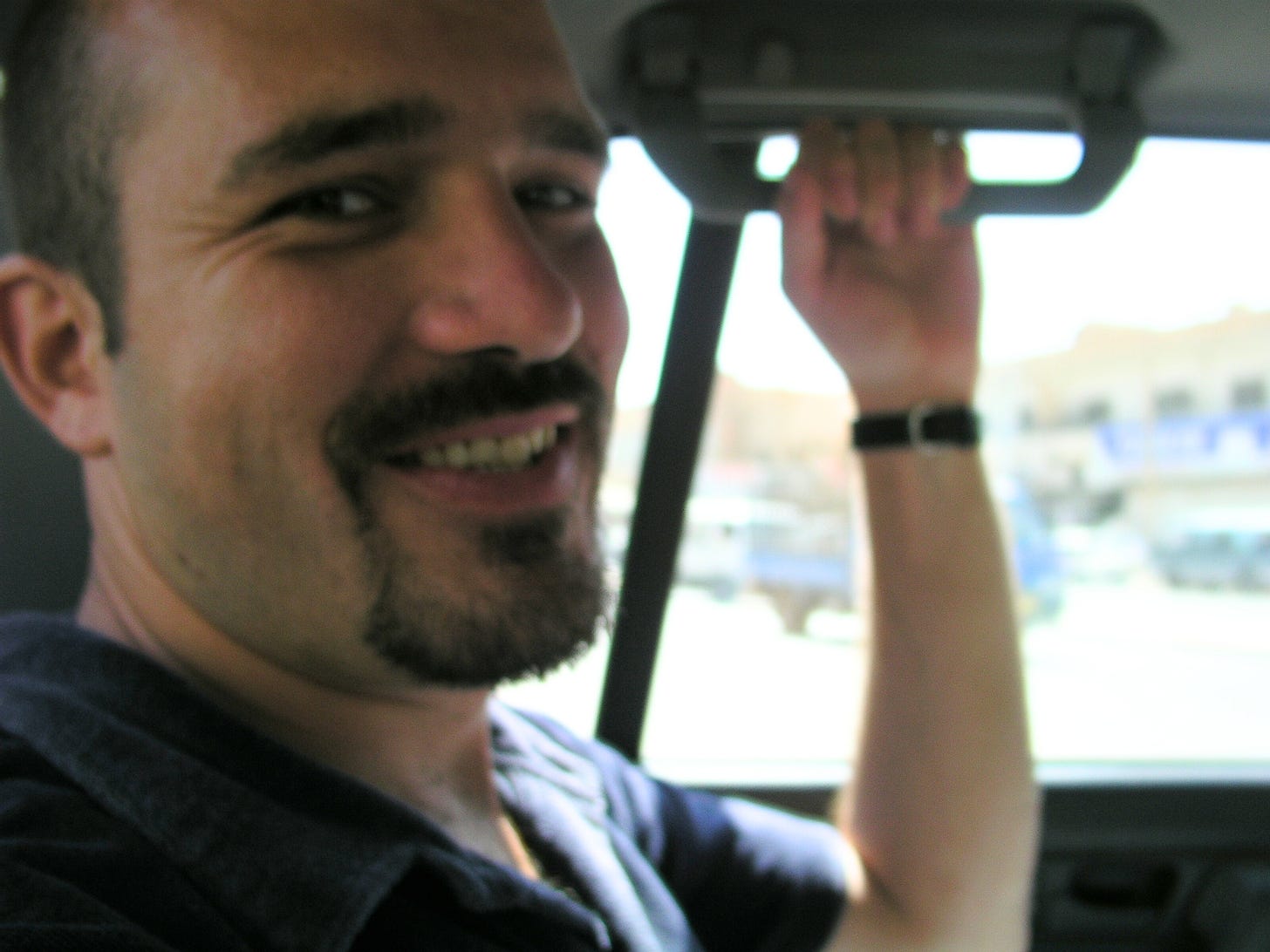In the summer of 2014, the nascent Islamic radical group known as Islamic State, or ISIS, overran the Iraqi Army and took control of huge swaths of northern Iraq and Syria in a bid to create a Caliphate, a hardline Islamic regime based on Sharia law. In Iraq, the country’s most prominent Shiite cleric, Ali al Sistani, called on the faithful to join with the government to repel ISIS forces. The movement that formed was comprised of several radical Shiite militias that had previously fought against U.S forces occupying Iraq.
Now, these former enemies joined forces against the hardline Sunni ISIS fighters. My guest today, Babak Dehghanpisheh, traveled to the front lines of the fighting during that summer and got an up-close look at what that collaboration looked like on the ground. His story, Iran’s Men in Baghdad, resonates with today’s headlines because the militias Babak profiled are intimately connected to Iran, and cut from the same cloth as the Shiite militia group Hezbollah, who just this week signed a ceasefire with Israel after a year of fighting.
It's great to have you. So before we get into all the details, let's do some scene setting. This is a pretty complicated story. It takes place about in Iraq in 2014. Tell us about the big picture. Who are the major players? What's the context?
In June of 2014, Islamic State launched a major assault on the city of Mosul, in northern Iraq, which is the second biggest city in the country. And after a few days of fighting, essentially the Oraqi Army and the branches of the security forces completely crumbled.
In Arabic, Islamic State is known by the acronym Daish, which means the Islamic government of Iraq and Sham, which is Syria. So they basically did see themselves as a force that was going to be taking over territory in both Iraq and Syria and they saw it as going back to the Koran as one broader region.
Right. And then they wanted to establish, or I suppose re-establish, some version of, the caliphate, right?
Exactly, not unlike what the Taliban did in Afghanistan. Harsh interpretations of Islamic rules and then maybe even some rules that they interpreted that had nothing to do with the Koran. Extreme punishments for crimes. It was a pretty draconian system.
I remember actually being on the phone with you at one point, I can't remember exactly where you were, but it sounded really hairy.
So how did you get there? Who were you with? And how did it compare to other kinds of combat situations that you've been in? You've been in, in many over the years.
Sure. Basically myself and the bulk of other journalists covering that at the time were based out of Erbil, which is not far from Mosul, but it's technically within the Kurdistan regional government area so it is a lot more protected.
I was working for Reuters at the time. We operated in teams — we'll always be with a photographer and videographer. The combat was pretty intense during that period. These were Kurdish Peshmerga and Shiite militias essentially fighting in small towns and villages around Mosul before they started the proper assault on Mosul itself.
"Out of nowhere, about half a dozen drones flew out of this small village. Islamic State had suicide drones — torpedo-like, loaded with explosives."
So I remember being in a front line position with the Kurdic Peshmerga. We were in a hilltop position and out of nowhere, all of a sudden come about half a dozen drones flying out of this small village. So, you know, you're seeing this capability like, okay: I guess Islamic state has suicide drones, or drones that have explosives tied to them.
And I just remember that we’re on top of this hill and as these drones are flying in, it's like, okay, any minute one of these drones could come crashing into our position and blow us up and there was really nowhere for us to run. You had maybe 200 of these Peshmerga guys open fire with their AK-47s. It was deafening having those machine guns going off at the same time. They got maybe one of the drones. The rest flew over our heads and then circled back. We scrambled down to lower ground.
Did you ever find out if they actually were suicide drones?
I literally saw one fly past us. It wasn't one of these drones that you can buy at Walmart or something. It looked like a big, long tube, like a torpedo. So I would assume that it was loaded with explosives that would have to be detonated at impact.
In terms of how that compared to other combat situations, it was completely nerve-wracking. As we were driving down to Amerli (a nearby village) for a reporting trip, you could actually see the Islamic state flags just a couple of hundred meters off the side of the road. So it just goes through your mind that if they're there, what’s to prevent these Islamic State guys from setting up a checkpoint on the road and kidnapping all of us, and as that group has shown they don’t exactly treat their captives well. Torture. Beheadings. So that was pretty nerve-wracking.
And just for listeners and readers who might not know, this is the same group that captured freelance American journalists, and journalists from around the world and held them captive for months. In the case of one of them, his name was James Foley, they very publicly trotted him out into the desert and beheaded him in an incredibly grizzly, blood-soaked ritual.
I remember that was a real turning point in terms of how journalists got treated, it was so spectacularly awful.
Yeah. I knew James Foley. If I remember correctly, he got kidnapped in the northern part of Syria. So he actually wasn't in Iraq, but same group, same guys.
Babak and Scott, Baghdad, 2003
Okay. So you're in northern Iraq, yards away from these ISIS fighters who will spare nothing to get their hands on a journalist. It's an incredibly violent and brutal situation. So as we get into the piece, we learned that among the groups that are fighting Islamic state that summer of 2014 were these three Iranian-backed militias. Some of them had pretty shady track records.
They'd been accused of staging attacks on U.S. forces in previous years. And I think some of them had been accused of mounting death squads elsewhere in Iraq to target Sunnis. Talk a little bit about the nuances of the U S-Iran relationship in that context, especially now looking at what's going on in the Middle East, that alliance is certainly a meeting of strange bedfellows, is it not?
It was definitely bizarre. Obviously the tensions between Iran and the U.S. go all the way back to the Iranian Revolution in 1979, when the Iranian government took hostages from the U.S. embassy and that dragged on for 444 days. In the context of Iraq, Iran used these proxy groups, these Shiite militias to attack US forces. Definitely they are responsible for the deaths of U.S. soldiers although by using these proxy groups, they always have some kind of plausible deniability even though, you know, pretty much everyone knew these groups were acting on Iranian orders. On the flip side of that, the U.S. was not shy in going after militant groups. and did kill many of their fighters and some of their leaders. Basically the U.S. and Iran were in conflict inside Iraq through most of the early 2000s.
By 2014, it goes back to the cliche: the enemy of my enemy…
When Islamic state popped up, the U.S. saw it as a clear threat to stability in Iraq. For Iran it was an existential threat. They threw everything they could at it in backing these Shiite militias. You had this odd situation where in that town Amerli, you had Iranian backed Shiite militias and the U.S. was backing them up with airpower.
It's such a fascinating visual, to think of all these Iranian militias running around on the ground with massive American air support coming in when needed. Especially now, because it's all in the news. All three of the militias that you profile were built on the Hezbollah model, which is to say, these kind of political military groups with charismatic leaders.
And now we're seeing Israel that just invaded Lebanon go after Hezbollah in southern Lebanon. So there's this sort of through line with Iran exerting its influence to varying degrees and with varying alliances over time, including the U.S. in this case. So I'm curious, how do you see Iran’s larger strategy of gaining influence? Feel free to talk about what's going on in the Middle East right now — I know you've been reporting on that extensively.
[Note: Since this interview, Israel and Hezbollah concluded a ceasefire.]
This strategy of using proxy groups has been an effective strategy for Iran for decades without being directly involved in conflicts, whether it’s against U.S. troops or Israel itself. Hezbollah has gone way beyond being a proxy group for Iran. They’re the dominant military force in Lebanon, the dominant political force in Lebanon and in many ways the dominant economic force in Lebanon too. So this has basically been to keep the conflict away from the homeland, to have these groups do the dirty work and for Iranians not to get involved themselves. But that changed when [Iran] directly attacked Israel, which was a historic first. And the initial Israeli retaliation was relatively minimal.
They targeted some air defense systems that the Iranians had purchased from the Russians they thought would keep them safe. The Israelis targeted those specifically to send a message to say they could hit basically anything in the country. And also this network of militias that Iran has built up in the region, whether in Iraq, or Syria. There are the Houthis in Yemen, Hezbollah itself — the Israelis in recent months have gone after them. The fact that they killed Hassan Nasrallah, the leader of Hezbollah, is really unfathomable. He’s been such a big presence in the region in terms of projecting Iran’s might. It should be said that while carrying out this operation against Hezbollah and then invading parts of southern Lebanon, the Israelis have also been responsible for around 3,000 civilian deaths.
You talked about their strike a few months ago, a historic first. Why did they do that?
That basically was spurred by an attack that the Israelis carried out in Damascus, where they hit what was part of an Iranian diplomatic compound. There were several senior members of the Iranian Revolutionary Guard who were killed in that attack. So it just came down to Iran couldn’t really not retaliate to that.
Haven’t there been attacks of a similar magnitude against Iran prior to that, or was that sort of next level?
So there have been attacks the Israelis carried out inside Iran, but it's all been sort of smoke and mirrors. The Israelis never take credit for it. They've killed senior members of the nuclear program and they’ve carried out attacks against Iran’s nuclear facilities and other facilities that are used for making missiles. But none of that was acknowledged.
The one that they did a few weeks ago was the first one where they came out and said: “Yes, we did that.” A warning. That attack knocked out several of these Russian aerial defense capacities that were around military sites, oil infrastructure, around nuclear sites. So they were clearly sending a message that next time they're going to hit the facilities themselves.
Babak in Baghdad, 2004
When I was in Iraq, I remember they were very effectively building up this reservoir of political and military might. They had all their key politicians enacting measures left and right. They had militias on the move. They were sending in certain kinds of artillery that were very effective against up-armored U.S. humvees. They were really quite active. And then when your story takes place ten years ago or so, they were, again, very active on the ground. But how would you characterize what has happened in Iraq since then, in the 10 years, since you wrote this story?
This was a real turning point in Iraq, that battle against Islamic State. So essentially after the defeat of Islamic State in 2017 and 2018, those [Shiite] militia groups followed the example of Hezbollah and of Iran’s own Revolutionary Guards. They entered into politics. They have big contracts in the economy for reconstruction. Some of the groups have oil contracts. Some groups have contracts for things like scrap metal. So basically they’re solidifying their position within Iraq.
That's not gone unnoticed by ordinary Iraqis. There was a series of protests starting around 2019 or so. It went on for about a year or two. They were couched as anti-government, anti-corruption, but there was a strong anti-Iran element and that was a first. There were people within the Shiite community who were protesting to reduce Iranian influence in the country. One dramatic thing that happened was the Iranian consulate in Karbala, which is a holy city with a revered Shiite shrine, was burned down. That would have been pretty unthinkable a decade before that. So I think ordinary Iraqis are trying to push back against this Iranian influence.
Okay, so you're you're half-Iranian. You speak fluent Farsi. You grew up for a number of years in Iran. You have played for me over the years any number of beautiful tracks of Iranian music. I know you're very involved in the culture and you appreciate it. But as a reporter, I imagine it's a bit more complicated. Talk to me a little bit about your relationship with Iran as a reporter. I know you've had your share of skirmishes and problems, but tell me a little bit about that, what that dynamic is like.
My family left Iran in 1982 and moved to the U.S. The first time I went back was in 2001, shortly after the September 11 attacks.
I am a dual national. My father’s Iranian, my mother’s American. I have both the passports. So I went back 9/11 and worked there as a journalist off and on for about ten years. The system in Iran is very weird when you're working there as a journalist. There's technically a Press Ministry. You basically have to get a reporting card from them.
I would try to game the system a bit. I knew the minute I’d go to the Press Ministry, I’d be followed. They would keep track of who I was talking to. Let's say I planned a reporting trip of 3 or 4 weeks. I’d come in with my Iranian passport, not tell the Press Ministry I was there, and go talk to sources that were more vulnerable. Activists, former officials and so on, who would be in trouble if they were seen talking to me. I'd talk to sources for a week or so. And then kind of go to approach the Press Ministry and say: “Hello, here I am.”
You need the press card for street reporting. If the police stop you and you show them a press card, generally they would let you go. I never got arrested by them, but I know that other journalists sometimes did get detained by then.
This is going to be important for our listeners, some of whom are journalism students. Just to understand that there are places in the world where there is very little or no freedom of the press.
The people you interview might get questioned afterwards by officials, right? About what they did or didn't say, so there's kind of an additional complexity. And an ethical responsibility to a certain extent when you're working in a system like that because you have to take into account what the potential consequences could be for yourself and also for the people you talked to right?
Absolutely. That's the biggest concern working in a place like Iran. The people you talk to could very easily get arrested. You just have to be very aware if you're potentially putting people at risk when you're talking to them, you have to try to be as discreet as possible.
“As we drove to Amerli, you could see Islamic State flags just a couple hundred meters off the road. It was nerve-wracking to think what would stop them from setting up a checkpoint and kidnapping us."
Let's say somebody's a vocal critic of the government, you have to ask them, how or where would they be willing to meet? Do they want to meet in a public place? A park? Their house? That was always a really delicate dance. And then you obviously have to defer to what they would gauge for their security.
And I think that's really important to note because people coming from more open societies, who've never been to a place like that, who've never experienced that kind of repression, don't really appreciate just how difficult it is for reporters to operate in those circumstances.
Right. In Iran, insulting the Supreme Leader can be a capital offense. It’s dramatically different than working in the U.S.
Are you allowed to go back to Iran? I mean as Babak? Or as a reporter? What would happen if you went.
I mean, theoretically, yes. I have an Iranian passport. I could jump on a flight. But after the 2009 protests, I did reach out to the Press Ministry and wasn’t overtly told not to come, but it was kind of made very clear that I shouldn't come. It's probably not a good idea for me to be there.
And then as you will recall, our Newsweek colleague Maziar Bahari got arrested there in the summer of 2009. Myself and about half a dozen other dual nationals working for Western publications met up at a kebab restaurant in Teheran and tried to hatch out a plan where we could get out safely.
We all had flights going to different locations leaving Iran, but we all decided to book the same flight to safety, going to Dubai. I got briefly detained at the airport, but thankfully it was just some minor thing about paying exit taxes. Maziar was held in custody for about six months all together, most, if not all of that, in solitary confinement. Physical and psychological torture, which he documents in his book and also was documented in a movie directed by Jon Stewart called Rosewater. The risk of arrest and tension is very real.
So let's jump back into the story. You've got this epic battle raging in northern Iraq. You've got these three militias that you profile and then you take us to this town that you referenced earlier, Amerli, in northern Iraq. Tell us about the town. What was, what was going on there?
So this town is a predominantly Turkmen Shiite. The Turkmen are yet another ethic group in Iraq. The militias felt a kinship with them and felt the need to rescue them once Islamic State took over the town.
By the time I got there, there was some sporadic fighting. The only way they would let us into town was to have one of the local commanders drive our car. We weren't thrilled about that and we tried to argue.
It was pretty fascinating talking to that particular [driver]. He admitted that the group was fighting in Syria. He also said that he himself had been fighting. He actually came out and said that [Syrian president] Bashar al-Assad was a dictator, which was pretty surprising to hear.
There was a bookish, nerdy-looking guy. Just by looking at him, you wouldn't think he'd be a militia commander. But he was quite open about Iranian support. He talked about the weapons they got, mortars, heavy machine guns, drones.
So if I'm hearing you right, the visit to a Amerli turned out to be a really rich reporting vein because you suddenly stumbled into all this regulatory information about who was fighting and who was arming them and what they thought, and what the war looked like from their perspective.
Was that just a happy coincidence, which does happen a lot, right? Or did you sort of know that was going to be a rich target and you had to get there?
There was just no way to know. It was just, “Where are these militias operating?” I had already talked to their political representatives in Baghdad and got their overall, sort of polished version. But the only way we're really going to see what these guys are doing is to go in person. Talk to the fighters, talk to the commanders. Are they operating? What are they doing? In that trip we came across a handful of fighters who actually spoke Farsi. [One of them] was probably there as a Revolutionary Guard advisor, working with this militia. That kind of detail wasn't something we could get from a distance.
It's worth noting for our listeners that that's one of the irreplaceable values of reporting, the kind of stuff you will never get at a distance. You'll never get it over the internet or a phone. There's just so much that you can only get by going there and seeing it in person.
Absolutely. Just to dial it back to Iran and the threat of arrest, it’s hugely frustrating. It's been 15 years since I’ve been back to Iran. Not being able to be there on the ground and not being able to interview people in person is frustrating. These militia groups are so secretive that there's no way you could get that kind of detail without being on the ground.
So we're going along in the piece. By the time we get to the end, the last few paragraphs get pretty grisly. I encourage readers to read everything, but tell us what you saw.
The end of the story takes place in a village. We got there relatively early in the morning. The Shiite militias and the Kurdish Peshmerga had teamed up to push Islamic State out. The first group we came across was Peshmerga. Their demeanor was different than the Shia militias who had been suspicious and surly. These Kurdish Peshmerga had taken over the porch of this house, right on the edge of town. And they invited us in immediately to sit down and drink tea with them. They said there were still pockets of these Islamic State fighters and they wanted to go on a patrol. Obviously our photo and video guys were really into that, they wanted to get images. That wasn’t exactly what I needed for print purposes but we went.
We came up to a checkpoint and there was a mangled body there and the way they described it was that this person had been an Islamic State suicide bomber, and he had kind of hidden at this checkpoint. And when one of the Peshmerga had approached with some Shiite fighters, this guy detonated his vest and killed one or two of those fighters.
“My family left Iran in 1982, and the first time I went back was in 2001, shortly after the September 11 attacks. Working as a journalist there was always a delicate balance."
So we'd been there for a while talking to the Peshmerga. This group of Shiite military fighters rolled up in a pickup truck. They had heard about what had happened. What followed is pretty gruesome and disturbing and still to this day is pretty hard to forget.
They beheaded the corpse and threw the head in a sack. Actually they mounted the head on a knife, which was even more disgusting. And basically said that this is revenge for our martyrs. Then they jumped in the pickup truck and went away.
That wasn’t the way the Kurdish fighters operated. They had been there for a while and they didn't feel the need to behead the corpse. But for the Shiite fighters, it was a religious war and having so many Shiite fighters filmed being beheaded, I guess this felt justified to them.
Obviously throughout the course of reporting the story, you were in a lot of difficult situations, from the drones that came chasing after you to interviewing these militias to then this situation that you've just described, where people's tempers are flaring and you've got a bunch of hotheads and they just behead somebody right in front of you.
What do you think is the the most important thing to keep in mind when you're interviewing people in dangerous situations like this, and by dangerous I mean physical danger, or in the sense that if you say the wrong thing at the wrong time, it could be misinterpreted. And you could find yourself looking down the wrong end of a rifle or a knife or something like that. What have you learned about how you interview people in those kinds of situations?
You just have to be very mindful of how you phrase questions, and also just being able to gauge their manner of speaking, their body language. They tense up. The mood shifts in the middle of an interview. Make sure you're not asking questions in a way that's going to be deemed as political or favoring one side or the other. Make sure you're not touching on something that's going to trigger them and send them spiraling down a path where all of the tensions and the adrenaline of the day, somehow it gets directed at you.
That same day, there was more fighting that broke out on a frontline in some farmland about a half kilometer out of town. This was where Islamic State had been. Our photo and video reps wanted to go so we went.
I decided to talk to some of the Peshmerga commanders. Immediately about 15 people gathered around and this was like: “Uh-oh, this is a bad idea.”
I was thinking, “Okay, these Islamic State guys are a few hundred yards away. One well-placed mortar could take all of us out. No more talking at this location. Maybe we can reconvene inside the town.”
You’ve spent so much time in the Middle East. I'm curious what you would recommend for young reporters and people who are simply interested in the region?
There's really no other way to get to know the Middle East other than to be there on the ground. To go to a church, a mosque, to go to an art gallery, to a music concert. Unless you're there experiencing life as the people who live in that area do, and unless you're talking to them, seeing these things that they see, smelling the stuff that they smell, there's just no substitute for that experience.
Wise words. Okay, a lightening round. You ready?
Let’s do it.
Your daily required reading list?
Obviously the big American newspapers: The New York Times. The Washington Post. I also read Iranian news outlets like BBC Persian.
Your favorite opinion columnist?
I'd have to go to the New York Times’ Frank Bruni and Maureen Dowd.
Your guilty media pleasure?
Probably entertainment. Rolling Stone.
Your favorite story by another reporter?
Stuff Anthony Shadid has done over the years. He was the best reporter of our generation in the Middle East before he passed away. One in particular where he did a train trip in Iraq. It's a first-person story.
Your favorite country to report from and why?
Iraq would have to be up there. It’s just a fascinating place. There’s the conflict but there are also so many different social things. I did a story about the dating scene once that was pretty fascinating.
Least favorite country to report from and why?
Probably the countries of the Gulf because inevitably it turns out to be kind of dry economic stories.
Your favorite research tool?
The Wayback Machine. That was particularly useful for a story that we did for Reuters that focused on their financial empire of [Iran’s] supreme leader. Once they realized that some of the financial information that they disclosed about other websites could be damaging, they shut down their sites, but through that Wayback Machine, we were able to dig stuff up.
I remember that story. It was terrific.
Thank you.
Words of wisdom for aspiring reporters out there.
Just get out and talk to people.
What about your number one “don’t” for aspiring reporters?
Don't always listen to what your editors say. Push back.
And trust your instincts too, right?
Yeah.
Last question What book are you reading right now?
It’s called the Lives of the Monster Dogs.
What is that?
It's a book about a gentleman who modifies dogs with voice boxes and hands where they walk on their hind legs and they act like humans.
Why am I not surprised? And on that surreal and altogether disturbing note, I want to thank you Babak. It’s been really great talking to you and I encourage everybody to read your work and check you out and follow you.
Great talking to you, Scott.
This interview has been edited and condensed for clarity.















Share this post